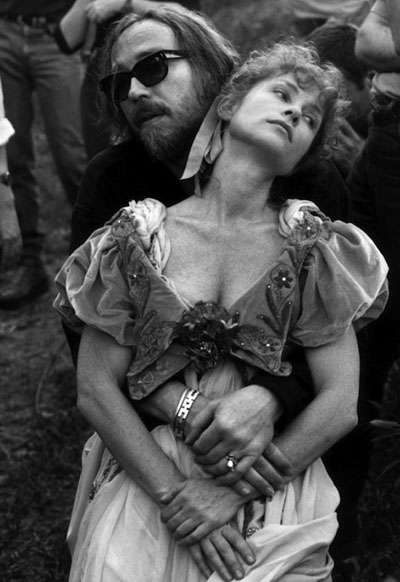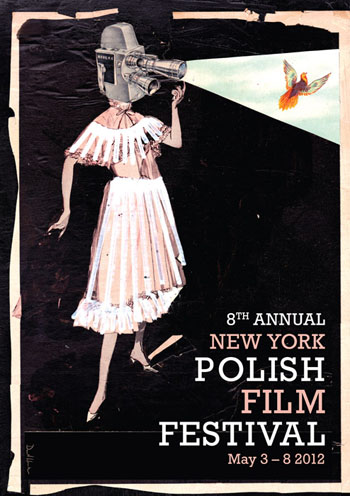There’s a Werner Schroeter retrospective on its way to the Museum of Modern Art in New York (May 11 through June 11), and you can be sure there’ll be a roundup here as it draws closer. In the meantime, Mónica Savirón has a fine preview in the new issue of the Brooklyn Rail: “It is important to realize that this cinema emerges in the second half of the 20th century in contexts of social, political, and sexual repression, dictatorships, censorship, and religious conflicts—a harrowing hall of mirrors within which Schroeter loses himself amidst the madness, blame, porn, and pain. Growing up in a country where millions of people were slaughtered, Schroeter used his eccentricity as a scream in the abyss, a visceral effort to write a new art history that no longer worked within the oppressive syntax of German culture.”
Also in the May issue, Tom McCormack looks back on e-flux’s retrospective of Adam Curtis’s documentary essays: “The Desperate Edge of Now, curated by Hans-Ulrich Obrist, marked yet another major stage in the canonization of one of the most ambitious contemporary political filmmakers.” Joshua K Leon: “Recent films like Up the Yangtze, Manufactured Landscapes, Last Train Home, and Urbanized rhythmically play upon the theme of human smallness, but [Allan Sekula and Noël Burch’s] The Forgotten Space departs from these by being overtly political, not at all shying away from its own interpretations. This is unapologetically leftist filmmaking.” And Justin Courter reviews Janyce Stefan-Cole‘s Hollywood Boulevard: “Throughout the novel we are reminded of how much most of our experience is contaminated by what we’ve seen in the movies.”
More reading. Geoffrey O’Brien‘s latest essay for the New York Review of Books is ostensibly a review of three recent releases on DVD/Blu-ray—Michel Hazanavicius’s The Artist, Martin Scorsese’s Hugo and Victor Sjöström‘s The Phantom Carriage—but of course, there’s far more to it than that: “The seduction of silent cinema is the seduction of a form as unique as opera or kabuki, a peculiar way of organizing one’s attention. It is a perpetual learning how to see, and a way of coming to the truth of one of Emerson’s observations: ‘The eye is final.'”
In other news. The L‘s Mark Asch suggests that BAMcinemaFest “is to Sundance, SXSW, Sarasota and Maryland as the NYFF is to Cannes, Venice and Toronto, maybe?” At any rate, it’ll be on from June 20 through July 1 and he’s got the full lineup. Some of the highlights look to be Craig Zobel’s Compliance, Tim Sutton’s Pavilion (one of my own SXSW favorites), Cory McAbee’s Crazy and Thief, both new films by Brian M Cassidy and Melanie Shatzky, Francine and The Patron Saints, So Yong Kim‘s For Ellen, Bill Ross and Turner Ross’s Tchoupitoulas, Dan Sallitt’s The Unspeakable Act and Keith Miller’s Welcome to Pine Hill.
New York. A retrospective of work by Tracey Moffatt opens today at MoMA and runs through May 13. In the L, Elina Mishuris recommends catching Hitchcock’s Marnie this weekend at the IFC Center, while Glenn Heath Jr has another tip for a midnight showing at the same venue: “Half delusional, half haunted, Walter Hill’s Wild Bill [1995] takes historical ‘revisionism’ to insane heights, splintering the idea of Western heroism into a thousand pieces.” And the New York Polish Film Festival is on from today through Tuesday.
Chicago. The Reader previews Facets Cinémathèque’s complete retrospective of The Cinema of Lucian Pintilie, on from today through May 13. And then there’s CINE-FILE‘s weekly guide to local alternative viewing.
In the works. David Michôd (Animal Kingdom) will direct Robert Pattinson and Guy Pearce in The Rover, reports Deadline‘s Dominic Patten.
Poverty Row Entertainment and producer Said Zahraoui have acquired the rights to Eileen Whitfield’s biography, Pickford: The Woman Who Made Hollywood, reports Lucas Shaw for Reuters.
For news and tips throughout the day every day, follow @KeyframeDaily on Twitter and/or the RSS feed.





